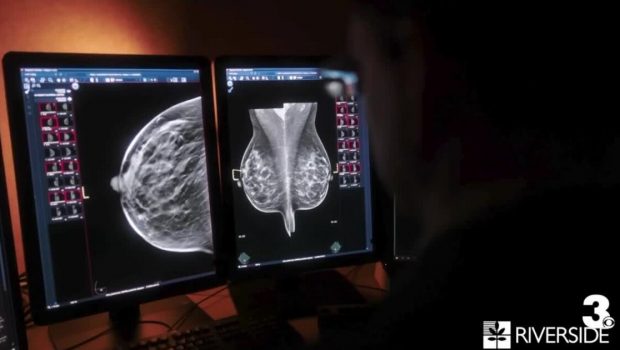“I couldn’t die.” Technology in Hampton Roads detecting breast cancer earlier
HAMPTON ROADS, Va. — While any cancer diagnosis is undeniably terrifying, technological advancements are dropping the mortality rate of breast cancer patients significantly. According to the Centers for Disease Control, since 1989, the amount of women dying from breast cancer has decreased by 40%.
This is partially due to advancements in early detection technology, some of which exists right here in Hampton Roads.
"I've been very impressed with the new technology," said Dr. Benjamin Pettus, a radiologist with Riverside Diagnostic Center.
Riverside's Siemens Heathineers 3-D mammography technology comes to Hampton Roads from Germany. Dr. Pettus said the equipment is creating a more hopeful future for those diagnosed with breast cancer, finding clumps of cancer cells at just 5 millimeters long. That's smaller than the size of a dime.
"The average on mammograms typically was 10 to 15 millimeters," explained Dr. Pettus. "We're definitely cutting that probably in half again. So it's quite impressive. I have a whole list of cases that I'm amazed I can't even find it on the 2D [technology] but on the 3D can find it early."
Finding cancer early using this technology has saved the lives of hundreds of survivors, including Linda Easley-Fulton.
"I couldn't die, there were so many things I wanted to do," said Linda. "Because my breast cancer was detected early, the cancer was maintained within the breast tissue. So that allowed for less aggressive treatment options."
Finding cancer before it spreads, Dr. Pettus said, is the difference between life and death.
"If people wait until they find something on a physical exam, the odds that it's already spread to lymph nodes, and is potentially metastatic, is significantly higher," he explained. "So it significantly translates to a decrease in mortality, basically better life, less treatment, a better outcome.
Dr. Pettus said these technological advancements have also allowed women to beat the disease without having to get a mastectomy.
"It basically takes cancer from a really scary, aggressive illness to basically a curable situation," he said.
And that's what happened with Linda, allowing her to celebrate her birthday in Vegas just weeks after surgery.
"I had surgery April 18. The second week in June, I was on family vacation in Las Vegas, living my best life, having fun," she explained. "And I have since gotten married."
But Linda said this wouldn't have been possible had she not discovered she had cancer early.
"While there's fear and anxiety for screening for breast cancer, a mammogram is one of the best ways for early detection, and the earlier the stage, the better chance of survival," said Linda. "And in this fight against breast cancer, we're stronger and braver than we think we are."
Dr. Pettus recommended beginning yearly mammograms at the age of 40. He recommends starting at age 35, or earlier if you have direct relatives who have been diagnosed with breast cancer.








Gloss